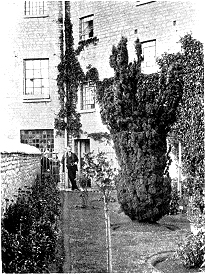|
|
A Month in an English Poorhouse,
Page 3 of 9  A Corner in the Women’s Garden
All matters which pertain to the government and management of a Union are in the hands of a board of guardians, consisting of at least one member from each parish represented, and as many more as the population of the parish justifies. All the Unions in the kingdom are under the jurisdiction of the national Local Government Board, established about twenty years ago. Their accounts are audited by a government auditor, and every institution is liable at any time to receive a visit of investigation from the government inspector. The O______ Union represents thirty-nine parishes, and there are forty-two members on the board. Meetings of this body are held in the board room at the Union every two weeks, presided over by the president of the board, who is chosen annually from among the members. The time required for these meetings and for the other duties devolving upon a guardian is not inconsiderable; but neither the president nor the members of the board receive any pay for their services. All clerical work connected with the institution, the keeping of accounts, etc., is performed by an officer known as the clerk of the board, who is paid £200 a year. Each Union also retains what is known as “the relieving officer,” whose salary, in the case of this Union, was the same as that of the clerk. The salaries of the clerk and the relieving officer are net, and they live outside of the building. The remaining paid officials are the master, matron, nurse and porter, who are paid smaller sums and boarded and lodged in the house. All applications for regular admission to the Union must be made through the relieving officer, and although the inmates can go out at any time they choose, they cannot return without a new certificate of admission. Any one who wishes to be taken into the house makes application to the relieving officer, stating his or her needs. If the officer is satisfied that he is justified in doing so, he grants admission until the next meeting of the board of guardians, retention after that depending upon the decision of the board. At the meetings of the board all cases come up for consideration, and if they are decided to be deserving, permanent residence is granted or an arrangement made for “outdoor relief.” The horror of going to the workhouse leads many to prefer to remain outside, to get along with the scanty assistance furnished them, in more independence, but probably much less comfort, than they would have if in the house. The maximum allowance for out-door re- |
|
3
Books & articles appearing here are modified adaptations
from a private collection of vintage books & magazines. Reproduction of these pages is prohibited without written permission. © Laurel O'Donnell, 1996-2006.
|
|

